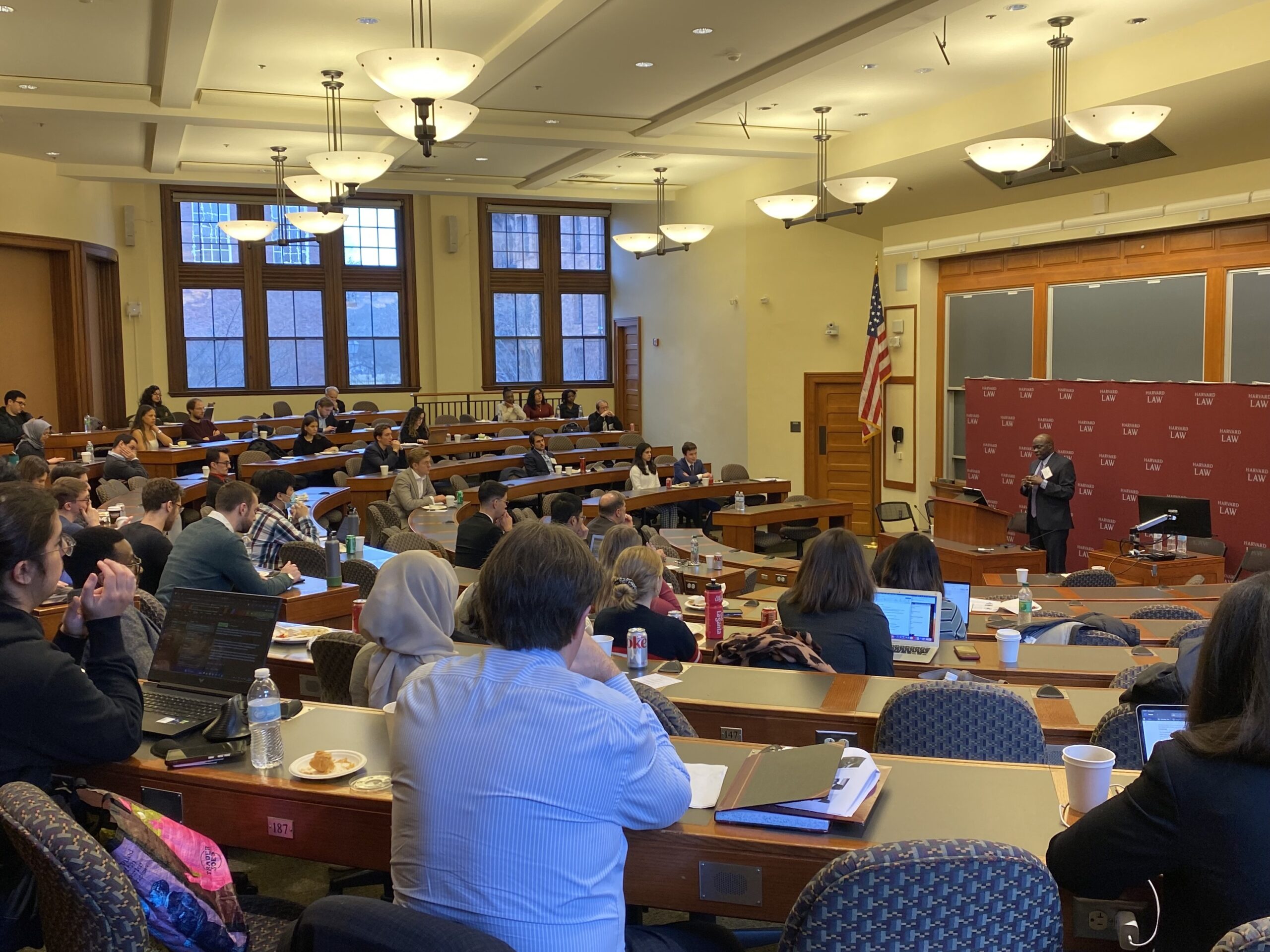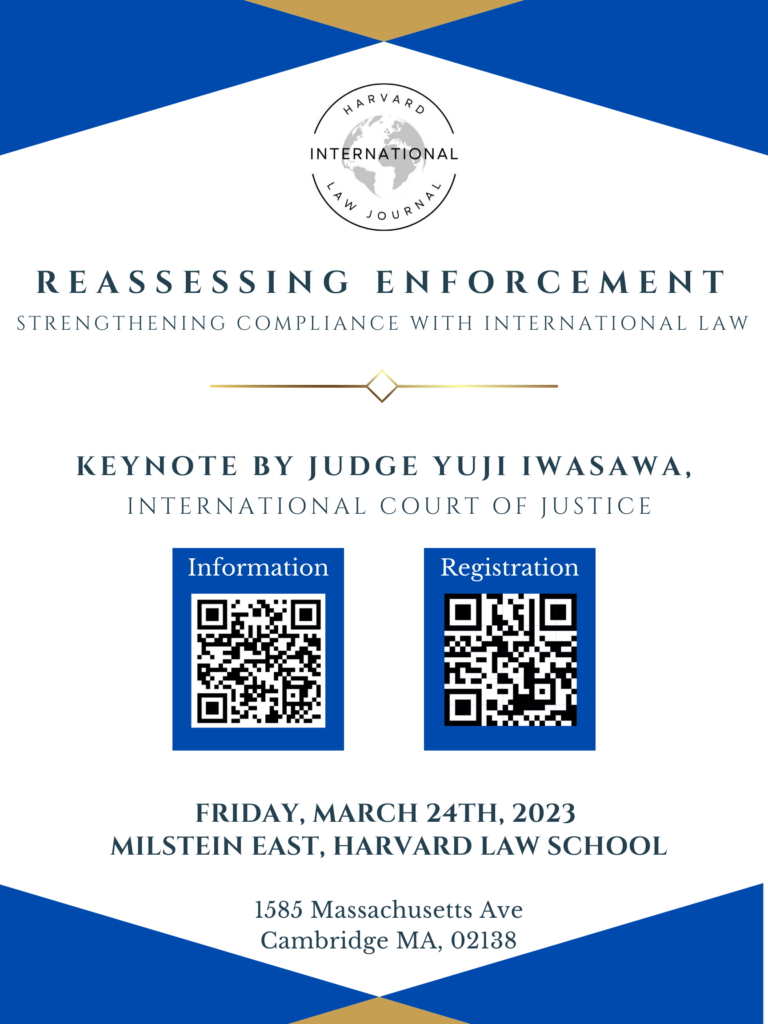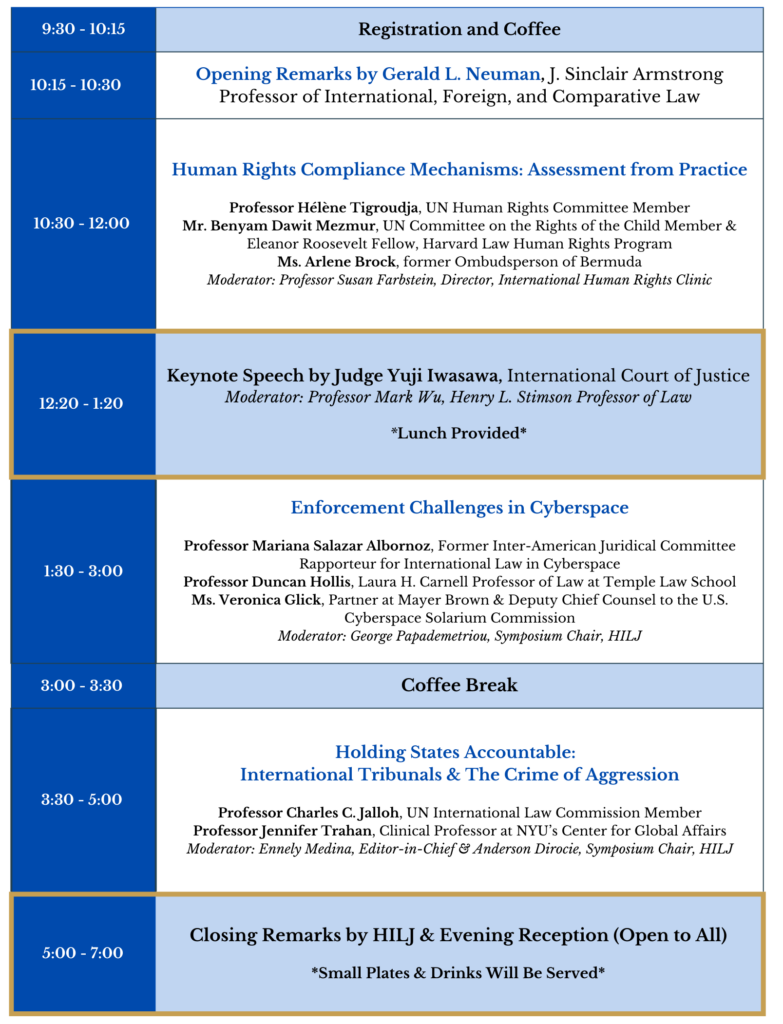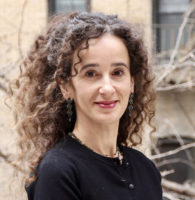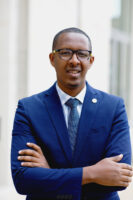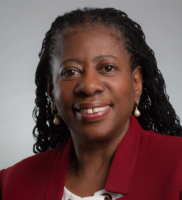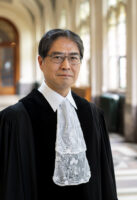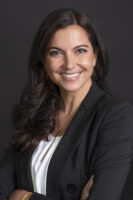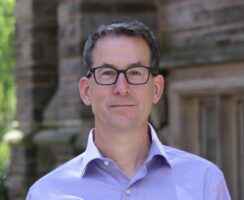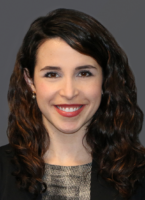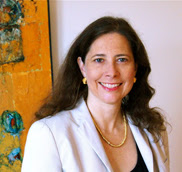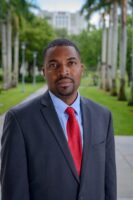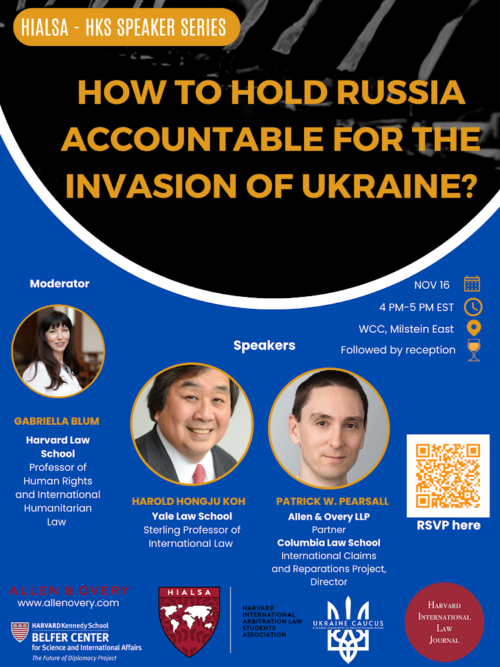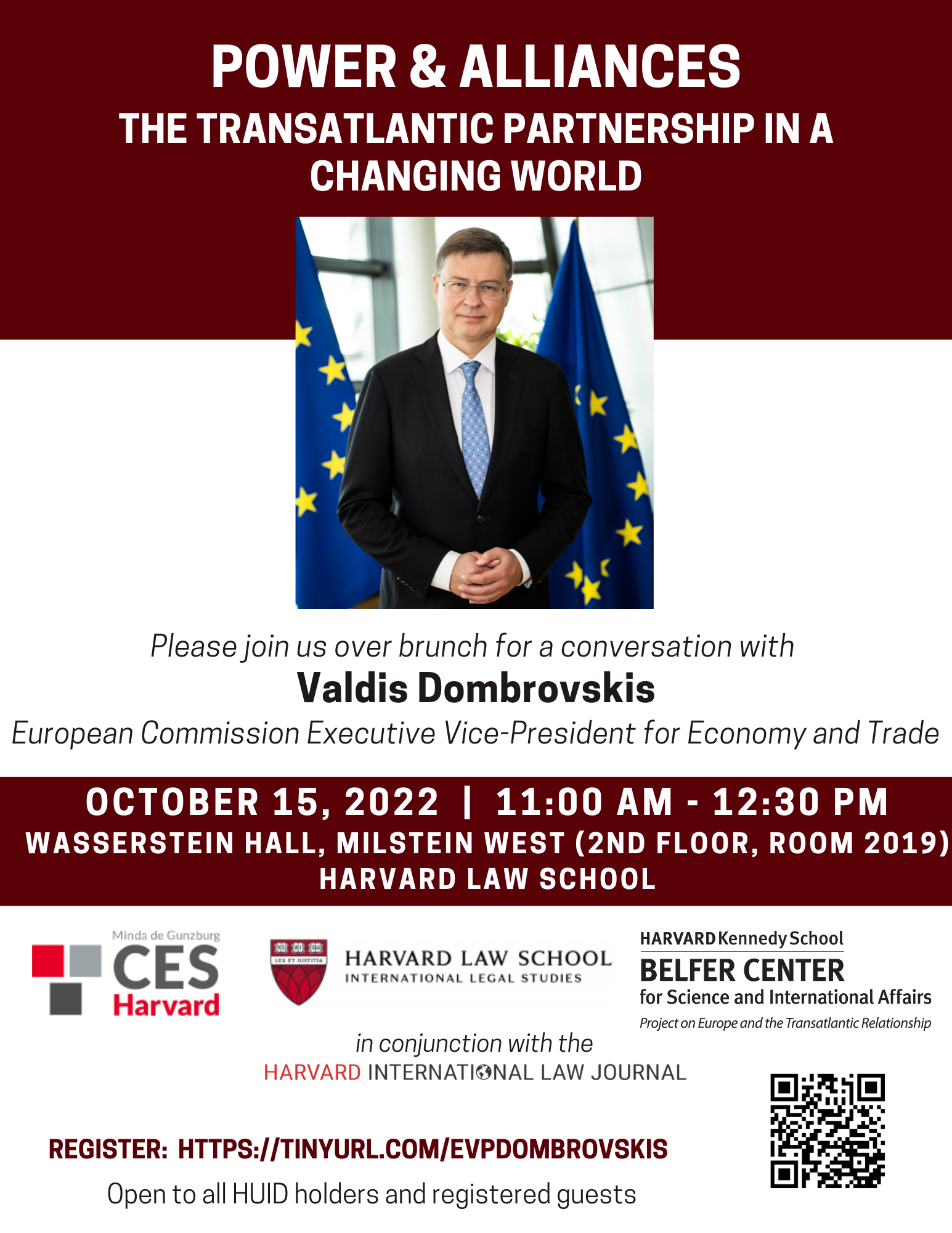2024 Annual Symposium Roundup: Harvard Looks to the Future of International Economic Law
[et_pb_section bb_built=”1″][et_pb_row][et_pb_column type=”4_4″][et_pb_text _builder_version=”3.8″]
Harvard International Law Journal and The Harvard Law & International Development Society*
On March 2, the Harvard International Law Journal and the Harvard Law & International Development Society jointly hosted the 2024 Harvard International Law Conference. The Conference focused on the future of international economic law and featured panels on foreign investment, sovereign debt, international financial regulation, and global trade reform. Each panel included experts from academia, governments, and private practice. In total, the Conference welcomed 19 speakers and over 100 attendees.
The Conference began with a discussion on foreign investment and emerging markets. Panelists included Dr. Zongyuan Zoe Liu of the Council on Foreign Relations, Daniel Crosby of King & Spalding, Rohan Sandhu of the Harvard Kennedy School, and Karen Mathiasen of the Center for Global Development. The panel was moderated by Cristian Rodriguez-Chiffelle of the OECD Business Investment Committee. The discussion began by questioning whether current multilateral regimes governing resources, exports, and investments are geopolitical in nature, and, if so, how they might require institutional reforms to better allocate monetary and market investments. Ms. Mathiasen cited the World Bank as an example of an institution with an inbuilt lending preference for emerging market economies, which are responsible for many current climate challenges, as opposed to low-income countries, which shoulder most of the effects of climate change. The panelists also commented on the rise of new geopolitical players in the global investment landscape. For example, Dr. Liu drew attention to the lack of transparency in Chinese mixed-ownership entities investing in the United States, while Mr. Sandhu pointed out the lack of capacity in India’s government to manage an influx of private investment.
[/et_pb_text][et_pb_image _builder_version=”3.8″ src=”https://journals.law.harvard.edu/ilj/wp-content/uploads/sites/84/IMG_5709-1.jpg” /][et_pb_text _builder_version=”3.8″]
The second panel explored sovereign debt in an era of “great powers.” The panel featured four experts: Prof. Mark Weidemaier of UNC Chapel Hill School of Law, Dr. Gregory Makoff of the Harvard Kennedy School, Melissa Butler of White & Case, and Dr. Sebastian Grund of the International Monetary Fund. Of particular interest to both the panelists and the participants were debt-for-nature swaps, a solution that exchanges a portion of a state’s existing debt for its investment in local nature conservation projects. The discussion also touched on various contributors to the global debt environment: collective action restructuring provisions, complex creditor groups, and the rise of new country lenders like China. Although the panel at times included lively disagreement, the speakers largely agreed that “brutal restructurings,” as described by Prof. Weidemaier, were often the only way out for sovereigns in debt distress. Current reform proposals that merely “tinker at the edges” (e.g., proposals to limit the powers of holdout creditors) may be masking the growing underlying sovereign problems,including the magnitude of refinancing needs in the coming decades.
[/et_pb_text][et_pb_text _builder_version=”3.8″ header_font_size=”1px”]
Hassane Cisse, Former Deputy General Counsel of the World Bank, delivered the Conference’s keynote address on the theme of global governance. Mr. Cisse was introduced by Ada Ordor, Professor of Comparative Law at the University of Cape Town and Visiting Professor at Harvard Law School. Prof. Ordor emphasized the need for international institutions to refocus their attention on issues relevant to developing economies, and, in particular, to Sub-Saharan Africa. Mr. Cisse’s speech built on the theme of s institutional refocusing as he encouraged consistent self-reflection and reform in global governance. He drew on 30 years of experience at the IMF and World Bank to share both positive and sobering examples of international institutional reform. Mr. Cisse then called for the development of more inclusive governance structures that accurately reflect the modern global political economy and proposed a “Declaration on Values, Principles, Rights, and Obligations to Govern Nation States and other Stakeholders in Global Governance”.
[/et_pb_text][/et_pb_column][/et_pb_row][et_pb_row][et_pb_column type=”1_2″][et_pb_image _builder_version=”3.8″ src=”https://journals.law.harvard.edu/ilj/wp-content/uploads/sites/84/m1-scaled.jpg” /][/et_pb_column][et_pb_column type=”1_2″][et_pb_image _builder_version=”3.8″ src=”https://journals.law.harvard.edu/ilj/wp-content/uploads/sites/84/IMG_5721-1.jpg” /][/et_pb_column][/et_pb_row][et_pb_row][et_pb_column type=”4_4″][et_pb_text _builder_version=”3.8″]
After the lunch break, the Conference proceeded with a panel on the future of international financial regulation. Present at the panel was Dr. Larissa de Lima of Oliver Wyman, Prof. David Zaring of Wharton Business School, and H. Rodgin Cohen of Sullivan & Cromwell. The speakers agreed that emerging technologies and digital innovations will challenge the international financial regulation status quo (e.g., digital assets and distributed ledger technologies), and regulators will need to improve their ability to keep pace with technology. The speakers noted that shared goals for future governance frameworks could include focusing on stability, limiting spillover effects, ensuring proper data sharing, and scaling standards to avoid regulatory arbitrage opportunities. The panelists noted that Basel III Endgame is a promising sign of international cooperation, but the fact that the U.S. may end up treating it as an aspirational ceiling for banking standards potentially endangers the coherence of Basel III’s workability. Further discussion centered on the need for liquidity regulation rather than a myopic focus on capital regulation. Finally, when it came to the future of the dollar’s reserve currency status, the panel noted that the current currency hierarchy may be affected by changing technology related to price discovery and search costs.
[/et_pb_text][et_pb_text _builder_version=”3.8″]
The fourth and final panel discussed the World Trade Organization and the international trading system more broadly. The panel consisted of Prof. Kathleen Claussen of the Georgetown University Law Center, Prof. Shipping Liao of Beijing Normal University School of Law, Pablo Bentes of Baker McKenzie, Prof. Petros Mavroidis of Columbia Law School, and Marc Gilbert of Boston Consulting Group. Taking place in the aftermath of a controversial meeting of the 13th Ministerial Conference of the WTO, the panelists generally agreed that international trade law and the institutions undergirding it are, if not in outright crisis, very much adrift. Against a backdrop of countries increasingly resorting to trade policy measures that the WTO had long ruled out of bounds, the recent Ministerial Conference’s inability to agree to more than stopgap measures, such as a temporary extension of the international moratorium on digital trade taxes, was uniformly found to signal a crisis of leadership, with major players such as the U.S., China, and the E.U. either unwilling or unable to take the reins in repairing the WTO’s credibility. The panelists also agreed that this gave room for rising powers, such as India, South Africa, and Brazil to exercise increased leverage, furthering their agendas and obstructing major initiatives that clash with their economic priorities. Finally, the panelists noted that international trade flows themselves had shifted, with the U.S.-China bilateral trade relationship giving up ground to new patterns of exchange between the U.S. and its North American neighbors, and with the developing economies of South and Southeast Asia. The panelists disagreed, however, on the nature of a core feature of this new status quo in international trade: the use of national security as a justification for departures from international trade norms. Some took the stance that this phenomenon is an inevitable feature of the international system, given that states have always intertwined economics with national security, and that the WTO would have to adjust to this reality by giving members greater flexibility to pursue national security goals under Article XXI of the GATT. Others adopted the position that this resort to national security is a slippery slope, giving countries a useful pretext to circumvent existing rules and unilaterally pursue non-national security oriented goals, such as climate policy or protectionism.
Speakers and participants finished the Conference by an evening reception at Harvard Law School’s Wasserstein Hall, where discussion on the future of international economic law continued.
[hr gap=”1″]
*The Harvard International Law Journal and The Harvard Law & International Development Society are student organizations at Harvard Law School.
[/et_pb_text][/et_pb_column][/et_pb_row][et_pb_row][et_pb_column type=”1_2″][/et_pb_column][et_pb_column type=”1_2″][/et_pb_column][/et_pb_row][/et_pb_section]


